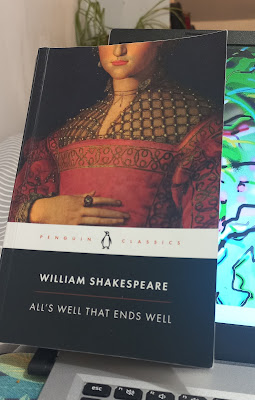All's Well That Ends Well
Another Shakespeare play to chalk off.
That last one (Coriolanus) didn't quite have the magic for me, but this one was much more to my tune. I really love these type of plays. I like the playful, flirty, wordy ones. Where it's all heartache and courtship. Clowns and witty women. They just have a charm. You want to be there.
It's in the Love's Labour's Lost/Much Ado About Nothing mould. In fact, I don't really have much to add, other than that I was reminded of Love's Labour's Lost (my favourite Shakespeare play) a few times whilst reading it. Firstly, just because it had a similar vibe - so I was thinking back to it with familiar fondness. Then later because there was a line in it that brought to mind the title.
Widow: [...] We have lost our labour
The apostrophes in the title have always vexed me a little. In the earliest published version it was simply printed as Loues labors loſt.
In the 1623 First Folio it became, Loues Labour's Lost.
A quarto published in 1631 returned it to, Loues Labours Lost (keeping the extra u spelling). Then finally, it reached the now common form of Love's Labour's Lost, in the Third Folio.
My grammar isn't great at the best of times - I've always tended to write by feel rather than rule - so I'm probably not the best person to pass judgement on where apostrophes should or shouldn't be. In fact, part of the reason I'm even bringing this up is to get a sense of catharsis. I've always had a real bugbear about people changing and editing other people's works. In my younger days I was especially bullish on this point, and in an earlier post on one of my other blogs I actually labelled people "idiots" for daring to edit the title of the play. I had that classic combination of ignorance and confidence. Anyway, when I think back to that now I still cringe a little. I clearly didn't know what I was talking about. I'm still not entirely sure about the grammar now, so I can't have known then.
I do think my younger instincts were right in the round though. I still feel now, as I did then, that it just looks more pleasing without the apostrophes. Plus, it can be read differently depending on how they're placed. The modern, common version tells us that the labour belongs to the love and it is lost. Which makes sense. However, it could be many labours of love that are lost: love's labours. It could also just be the string of words, intended to give a vague poetic alliterative sense, as in: loves, labours, lost. This is the sense that most appeals to my personal taste.
Maybe Shakespeare deliberately intended the meaning to be open-ended. Or maybe he just wasn't that bothered one way or the other. Spellings and grammar were a long way from being formalised back then, so he wouldn't have even been thinking according to our rules anyway. Conventions about what is and isn't "correct" can come and go like fashion, but the feel of something is more universal. As I waste another paragraph discussing something as pedantic as apostrophes I'm beginning to miss my younger self, who just ignored all the rules and wanted to drink straight from the source.
Anyway, All's Well That Ends Well, the play that I was supposed to be typing about, was a breeze to read. Next up I have Titus Andronicus. I'm not too sure what to expect with this one. I can't imagine it'll have the same fun and lightness, though I am hoping there may be a few little oddities and curios. Something to write about other than apostrophes.






Comments
Post a Comment